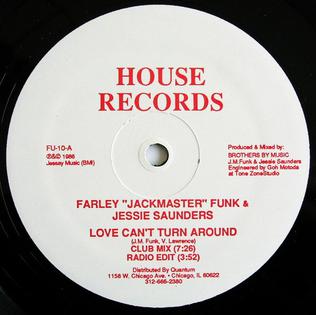Related Research Articles
House is a genre of electronic dance music characterized by a repetitive four-on-the-floor beat and a typical tempo of 115–130 beats per minute. It was created by DJs and music producers from Chicago's underground club culture and evolved slowly in the early/mid 1980s as DJs began altering disco songs to give them a more mechanical beat. By early 1988, house became mainstream and supplanted the typical 80s music beat.
Chicago house refers to house music produced during the mid to late 1980s within Chicago. The term is generally used to refer to the original house music DJs and producers from the area, such as Ron Hardy and Phuture.
An acid house party was a type of illegal party typically staged in abandoned warehouses between 1987 and 1989. Parties played acid house and acid techno music, electronic music genres with a distinct sound from the use of the Roland TB-303 synthesizer. The origin of the term acid house party is disputed coming either from the 1987 song "Acid Tracks" by Phuture, or the consumption of MDMA and LSD that were common at the parties.
The Hot Mix 5 are an American DJ team originating from Chicago, Illinois, who were chosen by WBMX Program Director, Lee Michaels in 1981. The founding members were Farley "Funkin" Keith, Mickey "Mixin" Oliver, Ralphi Rosario, Kenny "Jammin" Jason, and Scott "Smokin" Silz. In 1984, Scott Silz was asked to leave the group and was replaced by Julian "Jumpin" Perez in 1985, as the winner of a HMF sponsored DJ Battle. Another DJ, Jeff Davis, was supposed to be a sixth member, but Silz mentioned in an interview that he never showed up, leaving just the five members. Julian's tenure as a member was about a year and then, Mario "Smokin" Diaz, became a member of the group and played with them throughout their radio time in Chicago.

Steve W. "Silk" Hurley, also known as J. M. Silk, is an American club DJ, house music producer, and songwriter.

Trax Records is an American independent record label based in Chicago, Illinois, United States. It played a major part in the development of house music.
Jacking, Jackin’, or the jack is a freestyle dance move in which the dancer ripples their torso back and forth in an undulating motion. It emerged within the context of Chicago house music in the 1980s.

"Acid Tracks" is a 1987 acid house song by Phuture produced by Marshall Jefferson and released by Trax Records. Phuture consisted of Nathan Pierre Jones, better known as DJ Pierre, Earl Smith Jr, and Herbert Jackson. Jones had been interested in developing dance music and became superficially interested in house music after Spanky had taken him to see DJ Ron Hardy perform in Chicago. The trio began developing tracks without finding anything that they felt was satisfying; Jones had heard a track made on the unpopular Roland TB-303 bass machine, which led the group to purchase one.

Nathaniel Pierre Jones, better known by his stage name DJ Pierre, is an American DJ and performer of house music based in Chicago.

Carlos Sosa, known as DJ Sneak, is a Puerto Rican-born American DJ and record producer raised in Chicago, Illinois, United States. He is noted as being one of the second wave of Chicago house producers, as well as a member of the vanguard of late-1990s United States house producers.
House dance is a freestyle street dance and social dance that has roots in the underground house music scene of Chicago and New York. It is typically danced to loud and bass-heavy electronic dance music provided by DJs in nightclubs or at raves.

"I Can't Turn Around" is a song written and originally performed by soul singer Isaac Hayes as the lead single from his 1975 album Chocolate Chip.
Vince Lawrence is an American dance music record producer, businessman and is one of the leading innovators of the genre of music called house music. Industry insiders recognize Lawrence as co-author of "On and On", the first recording officially designated "house music". He worked with Jesse Saunders in the initial creation of Jes Say Records, designing its logo by hand. He served as head of marketing and was the lyric writer for "Funk U Up", "Undercover" by Dr. Derelict, "Real Love", and many other songs released in the label's heyday. He also co-authored "Love Can't Turn Around", which featured Daryl Pandy and reached No. 10 in the UK Singles Chart in 1986, starting the house music revolution in the UK. He organized Trax Records, a Chicago house label. He is the founder of Slang MusicGroup, which has received numerous gold and platinum awards for their contributions.

"Love Can't Turn Around" is a 1986 Chicago house song by American musicians, DJs and record producers Farley Keith Williams a.k.a. Farley "Jackmaster" Funk and Jesse Saunders featuring vocalist Darryl Pandy. It holds an important place in the history of house music as the first record in that genre to cross over from the US clubs to the UK Singles Chart.
Colin Curtis is a British DJ whose career spans several decades and musical developments.

"Music Is the Key" is the debut single by J.M. Silk, and the first release issued on D.J. International Records in 1985.
Darryl Pandy was an American gospel and house music singer from Chicago.

Now That's What I Call 80s Dance or Now 80s Dance is a triple-disc compilation album which was released in the United Kingdom on 14 October 2013. It includes nearly 60 of the biggest dance anthems of the 1980s era.

D.J. International Records is a Chicago record label founded in 1985 that specializes in house music, a type of electronic dance music. In the 1980s, DJ International Records released music by key house innovators such as Frankie Knuckles, Ron Hardy, Hot Mix 5 member Farley "Jackmaster" Funk, Steve “Silk” Hurley, and Marshall Jefferson. DJ International Records also released ESP’s song "It's You", Dymond's "Wild About Your Love", and Liz Torres' "What You Make Me Feel". The label also released acid house, such as Adonis's 1987 "The Poke" and Tyree's "Acid Over", as well as late 1980s hip house recordings, such as Fast Eddie's "Hip House" and "Yo Yo Get Funky". In the early 1990s, the label released Mike Dunn's song "Jass Yo Azz Off". Udiscover Music called the "history of DJ International...the history of house music, the very DNA of modern dance music."
The Night Writers was a Chicago House group that was active from 1987 to 1989. Often considered an alias for Frankie Knuckles, who produced both of the group's landmark singles, the Night Writers' discography was also written by the lesser-known duo of Jere McAllister and Henry Riley Evans, with original vocals for "Let the Music Use You" performed by Ricky Dillard. "Let the Music Use You" was first released in 1987, with the subsequent release of "Over You" in 1989. Although the group dissolved following the release of "Over You," several individual members have released discography under variations of the same alias. McAllister briefly released music as The Knight Writers, while Evans used the alias Nitewriterz.
References
- 1 2 3 Bush, John. "Artist Biography". AllMusic . Retrieved November 29, 2020.
- 1 2 Colin Larkin, ed. (2003). The Virgin Encyclopedia of Eighties Music (Third ed.). Virgin Books. p. 190. ISBN 1-85227-969-9.
- ↑ "RIP Darryl Pandy". The Wire . June 14, 2011. Retrieved August 23, 2019.
- ↑ Roberts, David (2006). British Hit Singles & Albums (19th ed.). London: Guinness World Records Limited. p. 216. ISBN 1-904994-10-5.
- 1 2 Baines, Josh (September 17, 2015). "We Spoke to Farley "Jackmaster" Funk, the Man Who Brought House to the UK". Vice . Retrieved June 17, 2017.
- 1 2 "HOUSE MASTER BOYZ AND THE RUDE BOY OF HOUSE - full Official Chart History". Official Charts Company. Retrieved July 4, 2022.
- ↑ "FARLEY 'JACKMASTER' FUNK - full Official Chart History". Official Charts Company . Retrieved September 24, 2020.